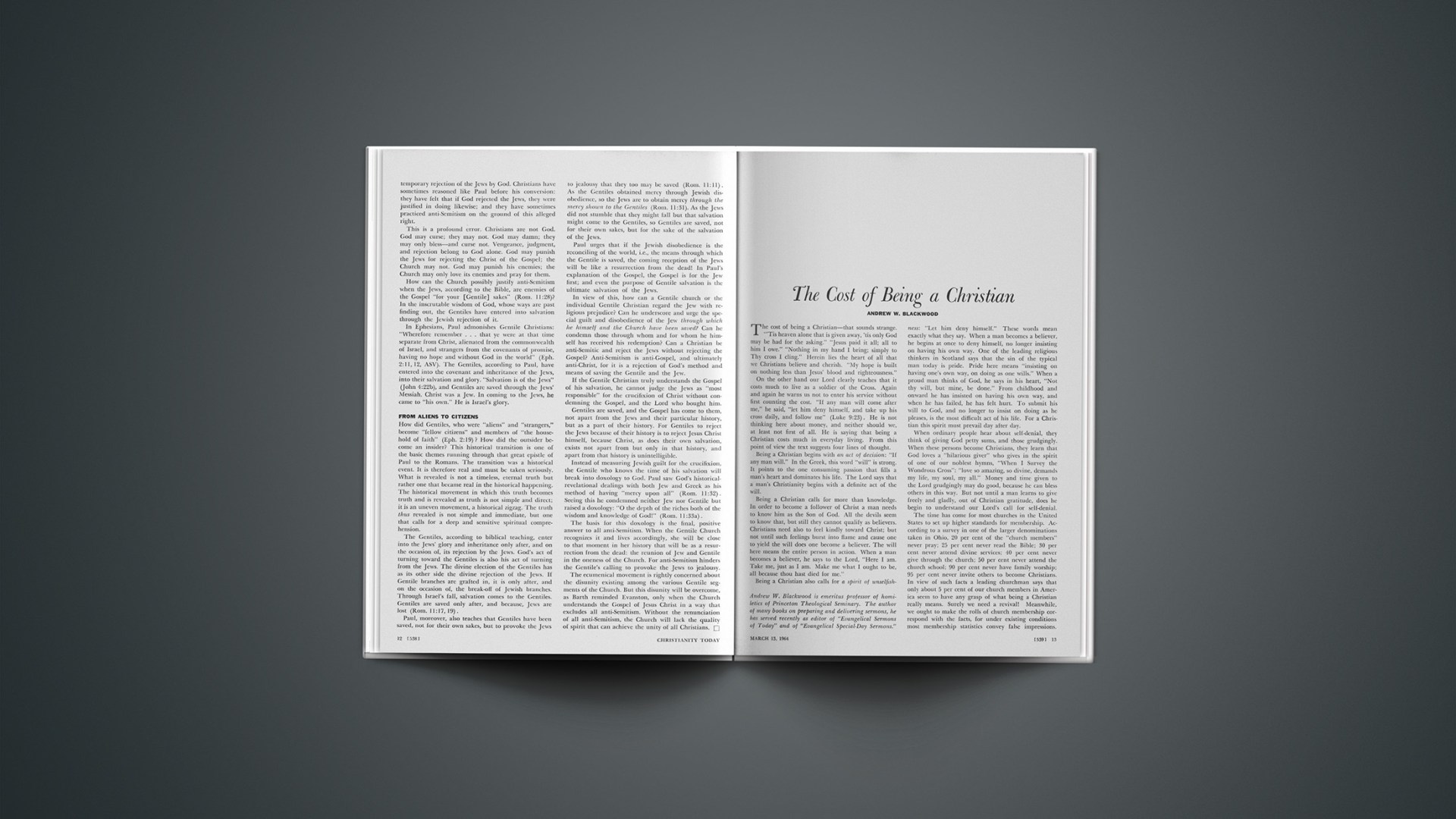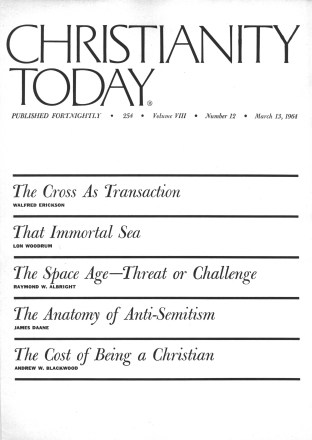The cost of being a Christian—that sounds strange. “ ’Tis heaven alone that is given away, tis only God may be had for the asking.” “Jesus paid it all; all to him I owe.” “Nothing in my hand I bring; simply to Thy cross I cling.” Herein lies the heart of all that we Christians believe and cherish. “My hope is built on nothing less than Jesus’ blood and righteousness.”
On the other hand our Lord clearly teaches that it costs much to live as a soldier of the Cross. Again and again he warns us not to enter his service without first counting the cost. “If any man will come after me,” he said, “let him deny himself, and take up his cross daily, and follow me” (Luke 9:23). He is not thinking here about money, and neither should we, at least not first of all. He is saying that being a Christian costs much in everyday living. From this point of view the text suggests four lines of thought.
Being a Christian begins with an act of decision: “If any man will.” In the Greek, this word “will” is strong. It points to the one consuming passion that fills a man’s heart and dominates his life. The Lord says that a man’s Christianity begins with a definite act of the will.
Being a Christian calls for more than knowledge. In order to become a follower of Christ a man needs to know him as the Son of God. All the devils seem to know that, but still they cannot qualify as believers. Christians need also to feel kindly toward Christ; but not until such feelings burst into flame and cause one to yield the will does one become a believer. The will here means the entire person in action. When a man becomes a believer, he says to the Lord, “Here I am. Take me, just as I am. Make me what I ought to be, all because thou hast died for me.”
Being a Christian also calls for a spirit of unselfishness: “Let him deny himself.” These words mean exactly what they say. When a man becomes a believer, he begins at once to deny himself, no longer insisting on having his own way. One of the leading religious thinkers in Scotland says that the sin of the typical man today is pride. Pride here means “insisting on having one’s own way, on doing as one wills.” When a proud man thinks of God, he says in his heart, “Not thy will, but mine, be done.” From childhood and onward he has insisted on having his own way, and when he has failed, he has felt hurt. To submit his will to God, and no longer to insist on doing as he pleases, is the most difficult act of his life. For a Christian this spirit must prevail day after day.
When ordinary people hear about self-denial, they think of giving God petty sums, and those grudgingly. When these persons become Christians, they learn that God loves a “hilarious giver” who gives in the spirit of one of our noblest hymns, “When I Survey the Wondrous Cross”: “love so amazing, so divine, demands my life, my soul, my all.” Money and time given to the Lord grudgingly may do good, because he can bless others in this way. But not until a man learns to give freely and gladly, out of Christian gratitude, does he begin to understand our Lord’s call for self-denial.
The time has come for most churches in the United States to set up higher standards for membership. According to a survey in one of the larger denominations taken in Ohio, 20 per cent of the “church members” never pray; 25 per cent never read the Bible; 30 per cent never attend divine services; 40 per cent never give through the church; 50 per cent never attend the church school; 90 per cent never have family worship; 95 per cent never invite others to become Christians. In view of such facts a leading churchman says that only about 5 per cent of our church members in America seem to have any grasp of what being a Christian really means. Surely we need a revival! Meanwhile, we ought to make the rolls of church membership correspond with the facts, for under existing conditions most membership statistics convey false impressions.
Being a Christian requires a habit of sacrifice. When our Lord says his follower must “take up his cross daily,” what does he mean? In the midst of his work for Christ in Africa, David Livingstone once declared, “I have never made a sacrifice.” He meant that only the sinless Son of God could ever give himself as the Redeemer from sin. So we Christians all believe; still, our Lord speaks about the cross of the Christian. We can think of this cross as calling for sacrifice. This sacrifice is not at all redemptive; still it is a sure proof of our love. It also costs—and far more than what 95 per cent of our church members seem willing to pay.
Burden, Thorn, And Cross
A well-known minister says that we sometimes get confused about three Bible terms: a “burden,” a “thorn in the flesh,” and a “cross.” A burden is something that a man bears because he must. As soon as he can do so with honor, he lays it down. For instance, he goes into debt to secure an education. As soon as possible he pays back the last dollar, and then he has more money for Christ and the Church.
As for the “thorn in the flesh,” it means something bodily, painful, sometimes excruciating. It is chronic. If in answer to prayer the Lord guides a man to a surgeon in a certain hospital, the thorn may be removed. If that proves not to be the will of the Lord, a Christian accepts his thorn until he dies. But a thorn is not a cross. A man never willingly chooses to have a thorn in his flesh.
The cross of a Christian is voluntary. Morning after morning, year after year, he takes it up; perhaps not always the same cross, but some cross. “Must Jesus bear the cross alone, and all the world go free? No, there’s a cross for everyone, and there’s a cross for me.” It may be easy to sing about bearing the cross, but it is never easy to take it up, and to keep doing so until at last it gives way to a crown of glory.
No one can feel sure about the cross of anyone other than himself. Only the Lord can surely reveal to a believer the nature of his cross. The same Lord stands ready to bless the Christian who accepts the cross as the gift of the heavenly Father’s love and then bears it day after day, not because he must, but because he can. In cross-bearing, as in the giving of money, the Lord blesses the person who responds gladly. For such a self-sacrificing spirit we can look at our missionary heroes and heroines. We should also find living examples here at home.
A large city church had an active Bible school, with a flourishing beginners’ department. When the officers needed a new superintendent for this work among little boys and girls, the pastor was asked to invite a woman who belonged to the church and worked all week as an expert kindergartner. She thanked him for the invitation, but declined. “After I deal with little boys and girls all week, I am worn out. On my rest day I need a complete change of thought and feeling. Please excuse me.” On the way home the pastor received a word from the Lord, which led him back to see the woman again. “Don’t you think that this work may be your cross?”
“Why, pastor, what do you mean?”
“The cross of the believer,” said the pastor, “is hard and heavy. Usually it has to do with persons near at hand. You do a certain thing day after day, not because you find it easy, but because you love the Lord and know that for you this is his holy will. ‘If any man will come after me, let him deny himself, and take up his cross daily, and follow me.’ ”
“Oh,” said the woman, “that puts the matter in a new light. Let me think about it and pray over it.” Soon she accepted the new opportunity to show what it meant for her to be a Christian.
Being a Christian issues in a life of service. Our text ends in what may at first seem like an anticlimax: “And follow Me.” The cost of being a Christian consists partly in doing the will of God, day after day, gladly and well, even though the work thus done be far from spectacular.
Days Of His Flesh
To follow Christ may mean to live now as he did in the days of his flesh. He went about doing good, whereas some of us simply “go about.” As the matchless Teacher he did good. Anyone who has ever done God’s will as a teacher can testify that this way of serving the Lord proves far from easy. So do the rewards prove far from light. According to a correct rendering of the Hebrew, “They that be teachers shall shine as the brightness of the firmament; and they that turn many to righteousness as the stars for ever and ever” (Dan. 12:3).
Christ also served God and men as the ideal Physician, the Healer of body and mind. As the son of a horse-and-buggy doctor I can testify that this work too involves much drudgery, often with no reward save that from above. In terms of today our Lord also served God as a preacher. “Never man spake like this Man.” Here, too, anyone worth his salt in the ministry can bear witness that the work calls for all of a man’s time and strength, with powers that come only from God.
The Lord does not wish every believer to serve him as a teacher, a healer, or a full-time minister or missionary. He does wish every Christian to serve as devotedly as though the Lord had called him into what we know as “full-time Christian service.”
If you do not already know this text by heart, commit it to memory now: “If any man will come after me, let him deny himself, and take up his cross daily, and follow me.” Remember that being a Christian begins with an act of decision; calls for a spirit of unselfishness; leads to a habit of sacrifice; and issues in a life of service.
If you have not yet entered the path that leads to God “through peril, toil, and pain,” kneel down right now. Give yourself into the hands that once were pierced, and trust in the heart that once was broken on the Cross. When once you find pardon, cleansing, and peace, then you will begin to know what our Lord teaches about the cost of being a Christian.
Andrew W. Blackwood is emeritus professor of homiletics of Princeton Theological Seminary. The author of many books on preparing and delivering sermons, he has served recently as editor of “Evangelical Sermons of Today” and of “Evangelical Special-Day Sermons.”










